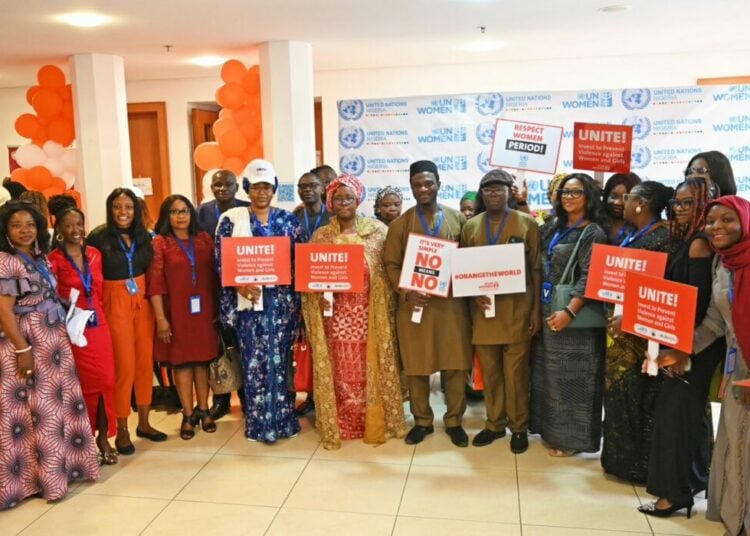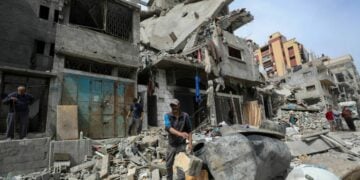The United Nations Women Nigeria has tasked the Nigerian Government with moving beyond policy formulation and ensuring effective implementation, monitoring, and accountability mechanisms that drive real change in Gender Inclusivity in peace-building efforts.
The Country Representative of UN Women Nigeria, Ms Beatrice Eyong, gave the charge on Tuesday at a three-day Nigerian Security Actors’ Gender Symposium organised by the Defence Headquarters Department of Civil Military Relations.
She commended Nigeria for attaining 37.9 per cent female participation in peacekeeping operations, surpassing the United Nations’ 17 per cent benchmark.
She said that while the development of gender policies was commendable, there was a pressing need to translate them into tangible actions.
“The real test of our collective commitment lies in implementation and impact. Therefore, I encourage all stakeholders — including security institutions, government ministries, and development partners — to move beyond policy formulation and ensure effective implementation, monitoring, and accountability mechanisms that drive real change,”.
However, she said the symposium presented an opportunity to evaluate progress, identify gaps, and generate innovative strategies for scaling up gender mainstreaming across Nigeria’s security sector.
“As we look to the next 25 years, we must ensure that our efforts deliver greater inclusion, stronger institutions, and sustained peace,” she added.
In his welcome remarks, the Director, Civil Military Relations, DHQ, AVM Olusola Akinboyewa, said the Armed Forces of Nigeria remained committed to building the capacity of its personnel and those of sister security agencies to understand, internalise, and apply gender-sensitive approaches in line with global best practices and national security priorities.
“As we deliberate today, let us remember that mainstreaming gender is not merely a procedural or institutional requirement — it is a strategic imperative. A gender-responsive approach enhances mission effectiveness, strengthens trust between security institutions and the civilian population, and ultimately contributes to lasting peace, stability, and national development.”
In her goodwill message, the Deputy High Commissioner of the British High Commission, Mrs Gill Lever, said the symposium formed part of the UK–Nigeria Security and Defence Partnership, where gender has long been a priority area.
She added that the gathering reinforces shared commitment to gender equality, inclusive security, and sustainable peace.
Gill assured that the UK–Nigeria military-to-military collaboration aims to strengthen civil-military cooperation, promote inclusive leadership, and foster gender-responsive security practices across Nigeria’s defence and security institutions.
“The UK Government will continue to support the review and renewal of the Armed Forces of Nigeria’s Gender Policy, as well as efforts to mainstream gender perspectives across security structures.”
She commends Nigeria’s efforts in proposing an “ambitious and forward-looking” National Action Plan on Women, Peace, and Security.
“It addresses emerging challenges such as climate-induced insecurity, gender-based violence, cyber and technology-related threats, and seeks to ensure that gender perspectives inform responses to evolving security realities.
“However, we must acknowledge that considerable work remains to be done. Globally and locally, gender inequality continues to pose serious challenges.”
She called on nations to protect women’s rights organisations and amplify their voices, “as their participation is vital in shaping effective peace and security outcomes.”
She reiterated that inclusive security institutions are more effective and trusted by the people they serve.
The Director General of the Institute for Peace and Conflict Resolution (IPCR), Dr Joseph Ochogwu, represented by Mrs Suzanne Uwakwe, said the symposium underscored the recognition that sustainable peace cannot be achieved without the inclusion of women.
He said gender perspectives were no longer optional, but rather essential.
“At the Institute for Peace and Conflict Resolution (IPCR), we strongly believe that peace and security cannot be sustained if they are not inclusive,” he said
According to him, global evidence consistently demonstrates that societies and institutions that empower women and ensure gender-balanced participation in peacebuilding and security decision-making tend to be more stable, resilient, and prosperous.
“This symposium could not have come at a more critical time, as Nigeria continues to navigate complex and evolving security challenges — from insurgency and violent extremism to communal conflicts and emerging transnational threats,” he said.
He added that Nigeria’s approach to peace and security must evolve. “We must move beyond traditional security paradigms to embrace inclusive, human-centred approaches that integrate the voices, needs, and experiences of both women and men at all policy formulation and operational engagement levels,”.





